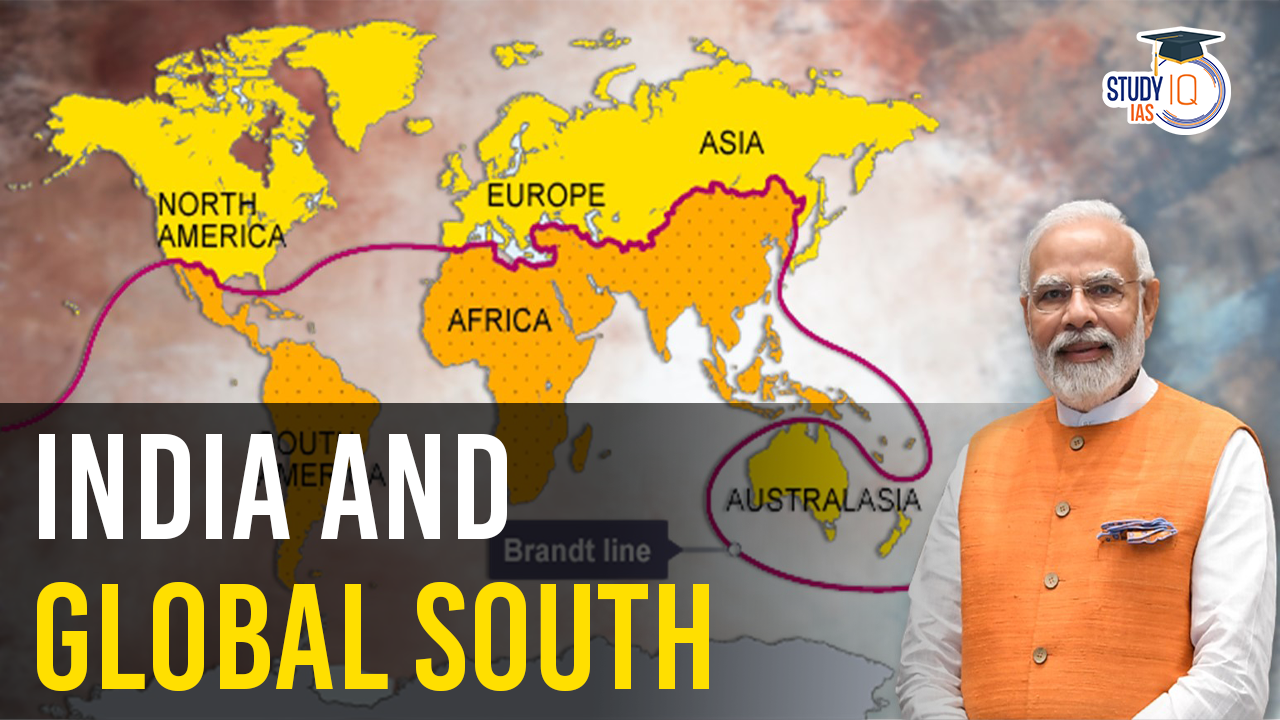Table of Contents
India And Global South Introduction
The term “Global South” refers to countries that are often described as ‘developing’, ‘less developed’, or ‘underdeveloped’. It encompasses countries in Africa, Asia, and Latin America, which are characterised by higher levels of poverty, income inequality, and harsh living conditions compared to the “Global North”. The “Global North” includes economically developed nations like the United States, Canada, Europe, Russia, Australia, and New Zealand. This classification is rooted in economic disparities, education and healthcare indicators, among other factors.
However, it’s important to note that this division is not solely based on economic wealth. In recent decades, countries like India and China have made significant economic strides, challenging the notion that the Global North is the sole epitome of development.
We’re now on WhatsApp. Click to Join
Significance of Global South
The Global South is significant because of its large population, rich cultures, and abundant natural resources. The economic prowess of the Global South has been increasing rapidly.
By 2030 it is projected that three of the four largest economies will be from the Global South, with the order being China, India, the U.S. and Indonesia. Already the GDP in terms of purchasing power of the Global South-dominated BRICS nations — Brazil, Russia, India, China and South Africa surpasses that of the Global North’s G-7 club. And there are now more billionaires in Beijing than in New York City. This economic shift has gone hand in hand with enhanced political visibility.
Countries in the Global South are increasingly asserting themselves on the global scene be it China’s brokering of Iran and Saudi Arabia’s peace deal or Brazil’s attempt to push a peace plan to end the war in Ukraine.
Challenges Faced by the Global South
Despite the progress made, the Global South confronts numerous challenges. Many Global North countries, responsible for higher global emissions, have been reluctant to fund green energy initiatives, leaving less-developed nations to bear the brunt of climate change consequences.
Unequal access to resources and the historical skew in favour of advanced economies in industrialization persist, hindering global convergence. Some major challenges faced by Global South are:
Supply Chain Hurdles
The rise in energy costs and fertiliser prices pose a substantial challenge to the Global South. Hence there is a need to relook at how essential commodities can reach the Global South and there is a need for securitisation of the supply chain for the Global South.
Energy Supply
A major problem confronting the Global South in the context of energy security is ensuring a sustainable energy transition. Since energy transition is a costly affair involving technology and finance, the countries of the Global South are the hardest hit in this regard. The need of the hour is to ensure a sustainable energy transition which can bring overall socio-economic development to the countries of the Global South.
Climate Change
It is a fact that the countries of the Global South are facing the adversarial consequences of climate change largely due to the historical polluters of the Global North. Hence there is a need to look at the process of climate change repercussions on the Global South from a broader perspective.
Multilateralism
The other important challenge in global geopolitics is in the form of the need for “genuine multilateralism” of the institutions of global governance, which will provide an equitable voice to all the countries. The dominance of the United States in international affairs continues to be a significant hurdle to achieving a multipolar world. There is a need to reform the United Nations Security Council (UNSC) along with other multilateral bodies to ensure equitable representation from the Global South.
Covid-19 Pandemic
The COVID-19 pandemic has accentuated existing divides, with Global South countries facing unique challenges in dealing with its consequences, both socially and economically.
The Russia-Ukraine war has further exacerbated concerns for least-developed countries, affecting food, energy, and financial stability. China’s Belt and Road Initiative (BRI), while offering infrastructure development, raises questions about its true intent and benefits for both parties.
Issues in South-South Cooperation
- Power Imbalances and Exploitation: Stronger countries in the Global South sometimes take advantage of weaker partners, undermining the principles of fairness and equitable collaboration. China, in particular, has been criticised for such practices.
- Environmental Concerns and Public Health: Certain international oil companies have been accused of disregarding environmental impacts and public health concerns while extracting natural resources. Addressing these issues is crucial for sustainable cooperation.
- Misuse of Financial Assistance: Some countries exploit the principle of lack of conditionality by diverting financial assistance intended for socially impactful projects to other purposes. This undermines trust and hampers genuine development efforts. Balancing economic cooperation and addressing internal conflicts is crucial.
- Lacks institutional and Financial Capacity: Global South is not a coherent group and does not have a single shared agenda and collective institutions created to voice concerns of Global South such as the Non-Aligned Movement. Further, there is also a lack of financial capacity among countries of the Global South.
Initiatives for South-South Cooperation
To address the unique challenges faced by Global South countries, various initiatives have been established. The BRICS Countries (Brazil, Russia, India, China, and South Africa) and IBSA (India, Brazil, South Africa) forums promote cooperation among these nations on multiple fronts, including economic development and global governance.
| IBSA (India, Brazil, South Africa) Forum |
It is a Trilateral Dialogue Forum of India, Brazil and South Africa which was created in the year 2003. The grouping was formalised under the name of the IBSA Dialogue Forum under the Brasilia Declaration. Its objective is to promote ever closer coordination on global issues between the three large multicultural and multiracial democracies of Asia, South America and Africa, and contribute to enhancing trilateral India-Brazil-South Africa cooperation in sectoral areas.
|
India as a Leader of the Global South
In a rapidly changing global landscape, India has assumed a pivotal role as the leader of the Global South, championing the interests and concerns of countries that have historically been underrepresented in international forums. As India takes on the G20 Presidency, it underscores its commitment to being the “voice of the Global South,” a term that encapsulates nations in Asia, Africa, and South America.
India has played a pivotal role in advocating for the TRIPS waiver, which aims to temporarily ease intellectual property rights on COVID-19 vaccines and treatments, enabling wider production to combat the pandemic.
The Vaccine Maitri campaign exemplifies India’s commitment to its neighbours, aligning with its ‘Neighbourhood First’ Policy.
India’s emergence as the leader of the Global South demands active engagement with regional politics within developing nations. Recognizing the diversity within the Global South in terms of wealth, power, needs, and capabilities, India must tailor its policies to different regions and groups.
India’s aspiration to bridge the North-South divide by focusing on practical outcomes rather than ideological battles aligns with the changing global dynamics. Effectively translating this ambition into policy could ensure no contradiction between pursuing universal and particular goals.
India’s Approach to Global South
The five pillars of India’s approach, include respect, dialogue, cooperation, peace, and prosperity
- India’s rich history as the leader of the Non-Aligned Movement and its economic and geopolitical clout in global politics are propelling New Delhi to play a greater role in global geopolitics.
- India provides a voice to the Global South Movement. Whether on the question of climate change, energy transition, taking a stand on normative issues or protecting the Global South’s interest.
- India played a proactive role in international forums over the years. By giving voice to the Global South countries, India helped in bringing out an alternative narrative to global geopolitics.
- At various climate Summits, India resisted the onslaught from the Global North and protected the interest of the Global South be it on the question of climate financing, limiting the emission norms, or highlighting the Global North’s responsibility as the historical polluter.
- India’s approach to democratising international relations and reforming the United Nations has been consistent with the demand of the Global South over the years. India has provided the necessary leadership to the Global South and a new narrative to global geopolitics.
| Voice of Global South Summit (VOGSS) |
India recently concluded its second Voice of Global South Summit, which was held virtually. This summit follows the inaugural summit in January 2023, signalling India’s commitment to fostering solidarity among nations and consolidating its leadership in the Global South. Its theme was Global South: Together for One Future.
Key Highlights of the Summit
India has already announced a series of initiatives to strengthen India’s engagement with the Global South in First VOGSS.
|
India’s role as the leader of the Global South carries immense significance in the evolving global order. India has the opportunity to shape a more equitable and inclusive world. However, it must navigate the challenges posed by climate change, geopolitical conflicts, and unequal resource access to fulfil its vision of a stronger, more united Global South.


 Serious Fraud Investigation Office (SFIO...
Serious Fraud Investigation Office (SFIO...
 Article 142 of Indian Constitution, Sign...
Article 142 of Indian Constitution, Sign...
 Pakistan-Occupied Kashmir (PoK): History...
Pakistan-Occupied Kashmir (PoK): History...





















